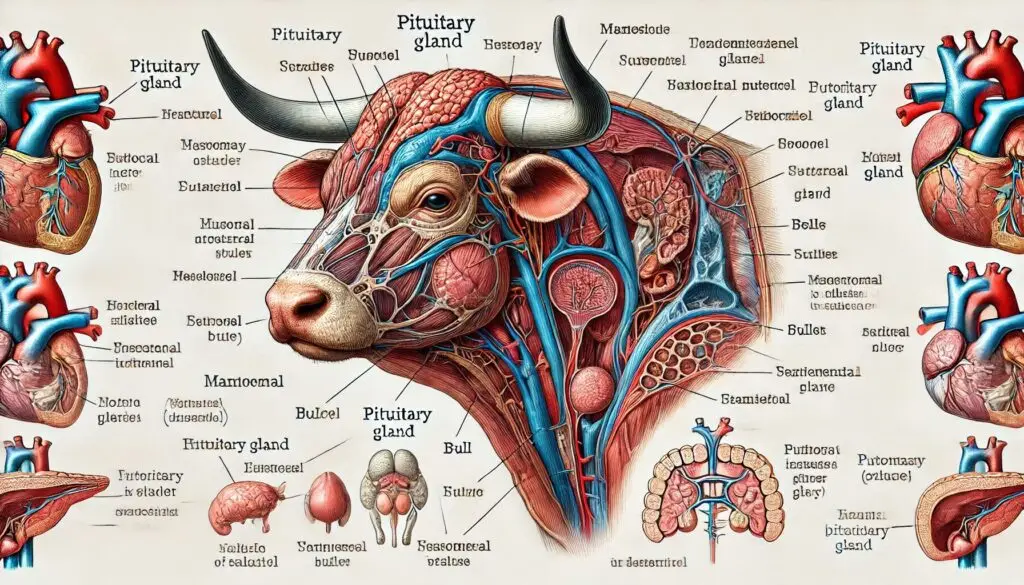Adrenal Cortex

Introduction to the Adrenal Cortex
The adrenal cortex is a crucial component of the adrenal glands found in livestock, particularly cattle. These glands are located on top of each kidney and play a significant role in hormone production. Understanding the functions of the adrenal cortex helps farmers and veterinarians manage animal health and productivity effectively.
Importance of the Adrenal Cortex
The adrenal cortex is responsible for producing several key hormones that regulate various physiological processes. These hormones are vital for maintaining homeostasis, managing stress, and supporting metabolic functions.
For more detailed information on adrenal gland functions, you can refer to the National Institutes of Health.
Structure of the Adrenal Cortex
The adrenal cortex consists of three distinct zones, each with specific functions:
Zona Glomerulosa
The outermost layer, known as the zona glomerulosa, produces mineralocorticoids such as aldosterone. Aldosterone plays a crucial role in regulating sodium and potassium levels in the body. This regulation is essential for maintaining blood pressure and fluid balance.
Zona Fasciculata
The middle layer, called the zona fasciculata, primarily produces glucocorticoids like cortisol. Cortisol is often referred to as the “stress hormone.” It helps manage stress responses by regulating metabolism and immune function.
For more insights into glucocorticoids, check out this article on Cortisol and Its Effects.
Zona Reticularis
The innermost layer is the zona reticularis, which produces androgens. These hormones are important for developing secondary sexual characteristics and influencing reproductive functions.
Hormonal Functions of the Adrenal Cortex
Understanding the hormonal functions of the adrenal cortex is essential for livestock management. The hormones produced by this gland have far-reaching effects on health and productivity.
Mineralocorticoids: Maintaining Electrolyte Balance
Mineralocorticoids like aldosterone help regulate electrolyte balance. They promote sodium retention while facilitating potassium excretion. This balance is crucial for maintaining proper hydration and blood pressure levels.
Glucocorticoids: Stress Response and Metabolism
Glucocorticoids such as cortisol are vital during stressful situations. They help mobilize energy by increasing glucose availability and suppressing non-essential functions like reproduction during stress. This response ensures that livestock can cope with challenging conditions.
For further reading on stress responses in animals, visit Animal Stress: A Review.
Androgens: Role in Reproduction
Androgens produced by the zona reticularis contribute to reproductive health in livestock. They influence behaviors related to mating and can affect growth rates.
The Impact of Stress on Adrenal Function
Stress significantly affects the adrenal cortex’s function. Various factors can induce stress in livestock, including environmental changes, handling practices, and disease.
Types of Stressors
- Environmental Stressors: Extreme temperatures, poor housing conditions, and inadequate nutrition can cause stress.
- Handling Stressors: Frequent handling or transportation can lead to acute stress responses.
- Health Stressors: Illness or injury triggers hormonal changes that affect overall health.
Physiological Responses to Stress
When livestock experience stress, their bodies release increased levels of cortisol from the adrenal cortex. This surge helps prepare them to respond to threats but can have negative effects if prolonged.
For more information on how stress affects livestock, see this article on Stress Management in Farm Animals.
Health Implications Related to Adrenal Cortex Function
Monitoring the health of the adrenal cortex is crucial for ensuring livestock well-being. Abnormalities can lead to various health issues.
Adrenal Disorders
Conditions such as hyperadrenocorticism (Cushing’s disease) can occur when cortisol levels become excessively high. Symptoms may include weight loss, increased thirst, and frequent urination.
For a deeper understanding of Cushing’s disease in animals, refer to Cushing’s Disease in Dogs.
Tumors of the Adrenal Gland
Adrenal tumors can also affect livestock health. These tumors may produce excess hormones or disrupt normal hormone production. Regular veterinary check-ups can help identify these issues early.
Impact on Productivity
The health of the adrenal cortex directly impacts livestock productivity. Cattle experiencing chronic stress or hormonal imbalances may show reduced growth rates or lower milk production.
Managing Adrenal Health in Livestock
Proper management practices can help maintain healthy adrenal function in livestock.
Nutrition Management
Providing balanced nutrition is essential for supporting adrenal health. Ensure that livestock receive adequate vitamins and minerals to promote overall well-being.
Stress Reduction Techniques
Implementing stress reduction techniques can significantly benefit livestock health:
- Comfortable Housing: Ensure that animals have access to clean, comfortable living conditions.
- Gentle Handling: Use low-stress handling techniques during veterinary visits or transportation.
- Consistent Routines: Establish consistent feeding and handling routines to minimize anxiety.
For more tips on reducing stress in livestock, visit Reducing Stress in Cattle.
Research Trends on Adrenal Cortex Functionality
Ongoing research continues to explore how adrenal function impacts livestock health and productivity. Scientists are investigating various aspects:
Hormonal Interactions
Researchers study how different hormones interact within the body to influence growth rates and reproductive success.
Genetic Factors
Genetic predispositions may affect how well an animal copes with stress or responds to hormonal changes. Understanding these factors can lead to better breeding practices.
For insights into genetic research related to livestock health, see Genetics of Livestock Improvement.
Conclusion
The adrenal cortex plays a vital role in maintaining health and productivity in livestock. By understanding its functions—ranging from hormone production to stress response—farmers can implement effective management strategies that support animal well-being.
Regular monitoring of adrenal health can prevent disorders that impact productivity. Emphasizing proper nutrition and reducing stress will enhance overall animal welfare.
By staying informed about advancements in research related to adrenal function, stakeholders can make better decisions that benefit both animals and producers alike.
More from Veterinary Anatomy:
Epithelial Tissue





Responses